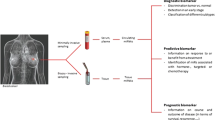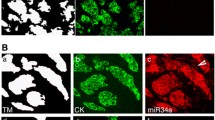Abstract
Arising from: L. Ma, J. Teruya-Feldstein & R. A. Weinberg Nature 449, 682–688 (2007)10.1038/nature06174; Ma et al. reply
MicroRNAs regulate messenger RNA expression but are frequently dysregulated in tumours. Ma et al.1 report that overexpression of microRNA-10b (miR-10b) initiates invasion and metastasis in models of breast cancer and that its expression in primary breast carcinomas correlates with clinical progression. We tested this in patients with primary breast cancer, of whom 92 had nodal metastases at diagnosis and 127 were node-negative. We found no significant association between miR-10b levels and metastasis or prognosis. Although we concede that miR-10b may have a biological effect in a few cells at the growing edge of a tumour, we believe that it is unlikely to correlate in whole tumour samples with clinical progression.

Similar content being viewed by others

References
Ma, L., Teruya-Feldstein, J. & Weinberg, R. A. Tumour invasion and metastasis initiated by microRNA-10b in breast cancer. Nature 449, 682–688 (2007)
McShane, L. M. et al. REporting recommendations for tumour MARKer prognostic studies (REMARK). Br. J. Cancer 93, 387–391 (2005)
Hudis, C. A. et al. Proposal for standardized definitions for efficacy end points in adjuvant breast cancer trials: the STEEP system. J. Clin. Oncol. 25, 2127–2132 (2007)
Tan, E. Y. et al. Cytoplasmic location of factor-inhibiting hypoxia-inducible factor is associated with an enhanced hypoxic response and a shorter survival in invasive breast cancer. Breast Cancer Res. 9, R89 (2007)
Camps, C. et al. hsa-miR-210 is induced by hypoxia and is an independent prognostic factor in breast cancer. Clin. Cancer Res. 14, 1340–1348 (2008)
Wong, L., Lee, K., Russell, I. & Chen, C. Endogenous Controls for Real-Time Quantitation of miRNA Using TaqMan MicroRNA Assays <https://products.appliedbiosystems.com/ab/en/US/adirect/ab?cmd=catNavigate2&catID=604344&tab=Literature> (2007)
Iorio, M. et al. MicroRNA gene expression deregulation in human breast cancer. Cancer Res. 65, 7065–7070 (2005)
Blenkiron, C. et al. MicroRNA expression profiling of human breast cancer identifies new markers of tumour subtype. Genome Biol. 8, R214 (2007)
Author information
Authors and Affiliations
PowerPoint slides
Rights and permissions
About this article
Cite this article
Gee, H., Camps, C., Buffa, F. et al. MicroRNA-10b and breast cancer metastasis. Nature 455, E8–E9 (2008). https://doi.org/10.1038/nature07362
Received:
Accepted:
Issue Date:
DOI: https://doi.org/10.1038/nature07362
- Springer Nature Limited
This article is cited by
-
Exosomal microRNAs in hepatocellular carcinoma
Cancer Cell International (2021)
-
The emerging role of exosomal miRNAs as a diagnostic and therapeutic biomarker in Mycobacterium tuberculosis infection
Molecular Medicine (2021)
-
A cancer stem cell-like phenotype is associated with miR-10b expression in aggressive squamous cell carcinomas
Cell Communication and Signaling (2020)
-
Plasma miR-21, miR-155, miR-10b, and Let-7a as the potential biomarkers for the monitoring of breast cancer patients
Scientific Reports (2018)
-
Heterogeneity of miR-10b expression in circulating tumor cells
Scientific Reports (2015)




